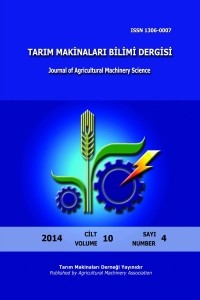Öz
Conventional combines have a set of straw walkers for separation of the grain from
the straw because the crop passes the concave very quickly and a lot of threshed grains are
therefore still contained in the straw. All combines contain a cleaner in which chaff, immature
grains and small straw particles are separated from the grains. After cleaning system, seeds are
conveyed to tank and then the chaff and straw are thrown a way from the combines. In eastern
countries, straw is very valuable material and for this reason farmers would like to gather them
along with the seeds during wheat harvesting. In order to collect the straw, a major modification
should be made on conventional combines and this is a costly operation. The objective of this
resarch was to design a vacuum type cleaning system for both separation of the grain from the
straw and for collecting the straw. For this reason, a traditional combine was modified with vacuum
cleaning system and was compared with conventional combines for wheat harvesting in Azerbeijan.
The experiment was conducted with three combines; two different conventional combines and one
modified combine at two different revolutions of thresher, 650 and 750 rpm. According to the
results; vacuum type cleaning system was found statistically successful for both separation of the
grain from the straw and for collecting the straw. Although this new cleaning system allows
collecting the straw, the field capacity was found to be low as compared to the traditional
combines. The field capacites were found to be 0.90, 0.96 and 0.30 ha h-1 for traditional combines
and the modified combine, respectively. It should be stated here that the modified combine is the
prefferred one by the farmer since obtaining the straw costs less eventhough the field capacity is
one third on the conventional ones.
Anahtar Kelimeler
Kaynakça
- Andrews, S.B., T.J. Siebenmorgen, E.D. Vories and D.H. Lower, 1993. Effects of combine operating parameters on harvest loss and quality in rice. Trans. ASAE, 36: 1599–607
- Arvinder, S., I.K. Garg, V.K. Sharma and A. Singh, 2001. Effect of different crop and operational parameters of a combine on grain damage during paddy harvesting. J. Res. Punjab Agric. University, 38: 241–52
- Asghari Meydani, J., R. Rahim Zadeh and A. Eskandari. 2003. Points around Applied Strategy to Reduce Wheat Waist on Harvesting. Abstract of Paper on First National Conference of Assessing Agricultural Crops Waists. Oct. 2003. Agricultural Faculty of Tarbiat Modaress University. Tehran. 264
- Dreszer, K. and J. Gieroba, 1999. Mechanical damage to grain in multi-drum threshing and separating sets. Int. Agrophysics, 13: 73–8
- Gill, R.S., S. Santokh and S. Singh, 2002. Performance studies on plot thresher for wheat. J. Res. Punjab Agric. University, 39: 408–16
- Kirkkari, A.M., S.P. Peltonen and H. Rita, 2001. Reducing grain damage in naked oat through gentle harvesting. Agric. Food Sci. Finland, 10: 223–9.
- Kowalczuk, J., 1999. Pattern of seed losses and damage soybean harvest with grain combine harvester. Int. Agrophysics, 13: 103–7.
- Kumar, R. and J.R. Goss, 1979. Analysis and modeling of alfalfa seed harvest losses. Trans. ASAE, 22: 237–42.
- Mansoori, H. and S. Minaee, 2003. Effects of Machine Parameters on Wheat Losses of Combine Harvester, pp: 92–4. First National Symposium on losses of agricultural products, Tehran: Iran.
- Santokh, S., H.S. Sidhu, S.S. Ahuja and S. Singh, 2002. Grain losses in combine harvesting of paddy. J. Res. Punjab Agric. University, 39: 395–8. Sheraddin, B. And J.Ghulan. 1991. Influence of Timing and Date of Harvest on Wheat Grain Losses. AMA. 22 (2): 56-58, 62.
- Singh, K.N. and B. Singh, 1981. Effect of crop and machine parameters on threshing effectiveness and seed quality of soybean. J. Agric. Eng. Res., 26: 349–55.
- Tahir, A.R., Khan and E. Khurram, 2003. Techno-economic feasibility of combine harvester (class denominator). Int. J. Agric. Biol., 5: 57–60.
- Tavasoli, A. And S. Minaei. 2002. Assessment of Processing Loss on John Deer Combine and Its Ground Speed. Abstract of Paper on Second National Congress of Agricultural Machinery and Mechanization. Nov. 2002. Karaj- Iran.
- Yavari, A. And S. Poordad. 2003. Assessment of Waist Rate on Different Sections of Combine in Wheat Harvesting on Kermanshah Province. Abstract of Paper on First National Conference of Assessing Agricultural Crops Waists. Oct. 2003. Agricultural Faculty of Tarbiat Modaress University. Tehran.
Ayrıntılar
| Birincil Dil | İngilizce |
|---|---|
| Bölüm | Makaleler |
| Yazarlar | |
| Yayımlanma Tarihi | 1 Ağustos 2014 |
| Yayımlandığı Sayı | Yıl 2014 Cilt: 10 Sayı: 4 |
Tarım Makinaları Bilimi Dergisi, Tarım Makinaları Derneği tarafından yılda 3 sayı olarak yayınlanan hakemli bilimsel bir dergidir.


